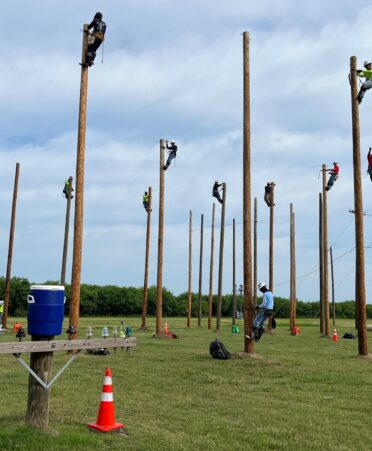(ROSENBERG, Texas) – Instructors in Texas State Technical College’s Electrical Lineworker and Management Technology program are helping students stay cool as their outdoor lab work heats up.
With humidity and heat enveloping the Houston region during the summer, it takes more effort to make sure that students can do their work. The students, meanwhile, get real-life experience training in the elements that they will have to work in after graduation.
Eddie Nunez, an instructor in the Electrical Lineworker and Management Technology program, said students know what they will deal with before entering the program.
“They know that in good weather, bad weather, hot, cold, sleet or rain, they will do this job in adverse conditions,” he said.
Students protect themselves from the sun by wearing long-sleeved shirts and jeans during labs. Nunez said this helps students get used to uniforms like they will wear once they are working in the field.
Nunez said hydration is key for students climbing utility poles during labs. Students bring their own containers of water, ranging from small bottles to gallon jugs, and can use a cooler of water in the pole yard.
“We typically tell them to hydrate the day before (an outdoor lab),” Nunez said.
Students take breaks during labs and, if needed, they can go into the shade or inside the program’s building to cool off. The goal is for students not to get heat exhaustion.
Nunez said the program’s instructors keep an eye on the weather, especially when rain is predicted. Students do not climb when there is lightning in the area.
Students go above and beyond their instructors’ recommendations.
Gerardo Najera, of Sugar Land, is a second-semester student working toward an associate degree in the program. During a recent class day, Najera sported a pullover mask he wears to keep the sun off his neck when he is on the poles.
“I am already used to the climate, having worked with my dad in construction since I was younger,” he said.
Najera played football and soccer in high school and uses some of what he learned about stretching when preparing to climb poles in lab sessions.
“At first, I was a little bit scared because the wind would shake the pole,” Najera said. “I am used to it now. Now I can see the good views.”
Jackson Pruzan, of Richmond, is a second-semester certificate student in the program. He also stretches before labs and, like several of his classmates, pays attention to the liquids he drinks and what he eats. Doing those things means the difference between having smooth or difficult lab experiences.
“When you are working with crossarm changers and are on top of the pole for 15 minutes, you can get lactic acid buildup in your legs and back,” Pruzan said. “You may get stuck (at the top of the pole).”
He said he prefers to work in the cold because it is easier to stay warm.
Pruzan spent two years at a junior college but did not find anything that appealed to him to study. He said a friend of his father’s works at a major electric utility company and told Pruzan about the work he does and how he is able to provide for his family. Pruzan said the teamwork aspect of line work appealed to him.
“I like contributing and helping people around me,” he said. “I like it. We have a good group.”
The Occupational Safety and Health Administration recommends that people who work outdoors use sunscreen with at least a 15 SPF (sun protection factor), wear ultraviolet light-blocking shades, and wear a wide-brimmed hat covering the ears, forehead, neck, nose and scalp.
Registration continues for the fall semester at TSTC. For more information, go to tstc.edu.
